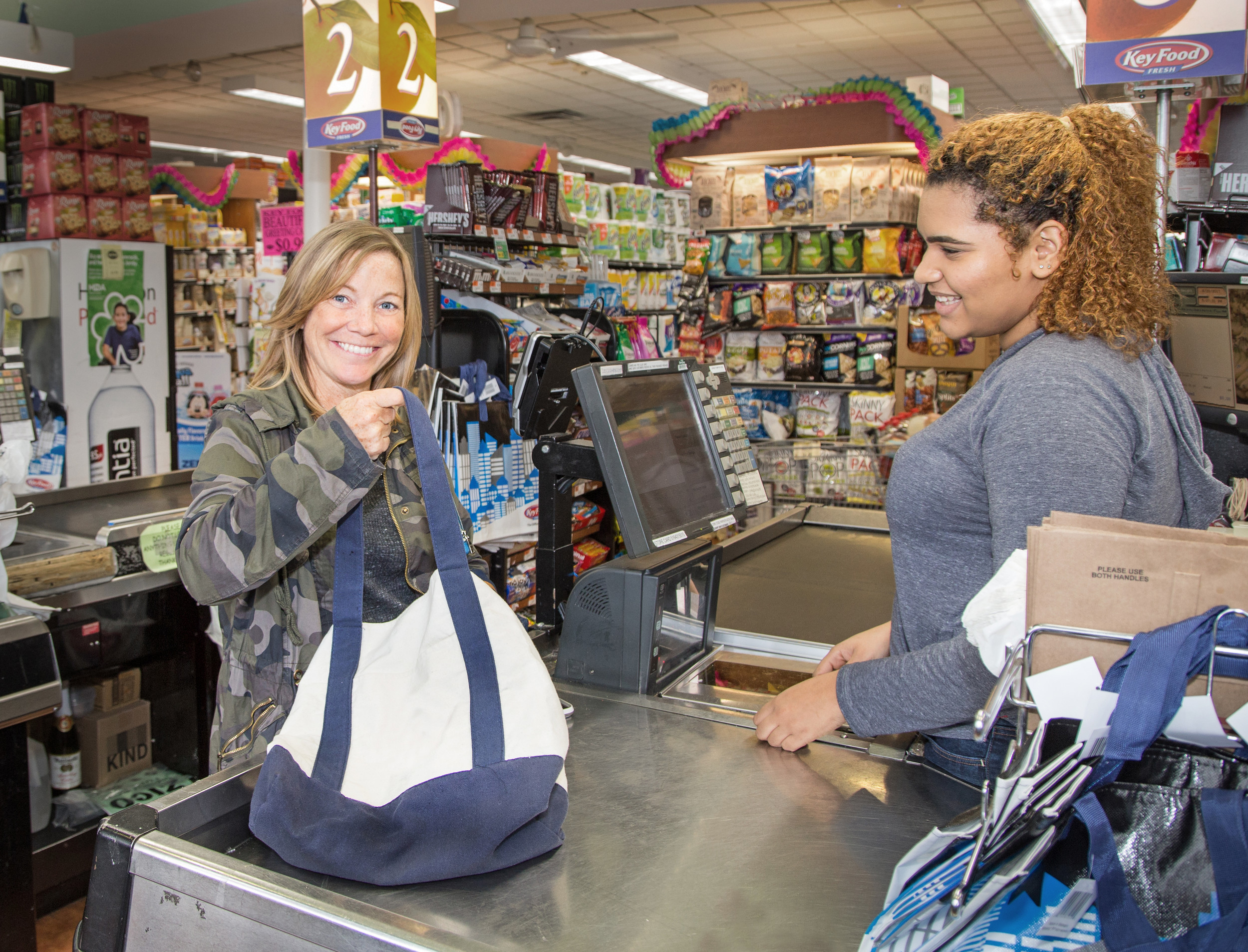Long Beach begins charging 5-cent fee on single-use bags
Long Beach businesses began charging at least 5 cents last week for each carryout bag that shoppers use, after the city’s new ordinance to limit single-use bags took effect on April 22. While many people have lauded the new initiative, a number of shoppers have expressed mixed opinions about the new fee.
The law was passed by the City Council last year and is aimed at encouraging shoppers to bring their own reusable bags while also reducing the negative environmental and economic impacts of single-use plastic and paper bags.
The rollout coincided with a number of Earth Day events, and the city, Chamber of Commerce and other organizations gave away thousands of reusable bags at Kennedy Plaza.
“It was a perfect day for our legislation to go into effect,” said City Council Vice President Anthony Eramo, adding that the city gave away 4,000 reusable bags. “It’s not about collecting fees; it’s about changing behavior and trying to create a cleaner environment.”
Long Beach is the first municipality in Nassau County to implement such a fee. Plastic and paper bag waste hurts the environment and is also a quality-of-life issue, officials said. Environmental organizations have estimated that 11 million plastic bags are used in Long Beach each year, but only about 10 to 15 percent are recycled. Under the new legislation, city officials said, they expect to see a 75 percent reduction in the use of plastic bags over the next three years.
Despite a seven-month public education effort by the city, chamber and environmental organizations, some shoppers were surprised by the new fee.
“Some people are having issues because they thought it was confusing, and some didn’t understand why paper bags were being charged the same as plastic bags,” said Leah Tozer, co-chair of the chamber’s sustainable committee, who added that most residents and businesses have been receptive to the effort. “The people who are having the biggest issues are the restaurants — their biggest question is, ‘What about to-go?’”
“It’s been horrible and great,” Chelo Urena, a manager at Key Food on East Park Avenue, told the Herald last week. “Most people are already coming in with the bags we had given away or purchasing them on their own. I’d say about 50 percent of our customers were already prepared, the other 25 percent are conforming and say it’s great for the environment, and then 25 percent are saying, ‘We’re going over the bridge and we’re not shopping here anymore.’”
Businesses are required to post signs at points of sale and encourage employees to ask customers if they brought a reusable bag. One customer who did not bring a bag, Urena said, walked out of the store when he was informed about the 5-cent charge and left his groceries on the counter.
“If they don’t want to pay for it, we tell them it’s the law — but the majority of the people are very pro-earth and environment,” said Urena, adding that Key Food gave away hundreds of reusable bags in the months leading up to the new ordinance. “We want to be a part of the community and also help the environment at the same time. I thought [the change] would be a lot worse, but it’s not that bad.”
Long Beach resident Katie Artz said she has been using reusable bags for years and supports the new law, but said that it came as a shock to some.
“It really wasn’t a change for me,” she said. “But I’m a little bit frustrated about things that I’m hearing, like cashiers being yelled at or people saying they’re going over the bridge to shop. I think for some people, change is just hard. I definitely noticed more people with reusable bags than I have before.”
Local stores keep the bag fees they collect to recoup the cost of those bags and to provide reusable bags for customers.
Sam Pinto, president of the Eastholme Civic Association, said that he supports reducing single-use bags, but said that some residents expressed frustration with some aspects of the new ordinance.
‘This isn’t about a fee,” Pinto said. “It’s about changing our culture and dependence on these single-use bags. We need to make sure store owners are reducing their dependence on supplying them to people and not taking advantage of the extra 5-cents of revenue per bag.”
Patchogue began its ban on single-use plastic and non-recyclable paper shopping bags last year, and the Suffolk County Legislature also approved a measure in 2016.
“They’re doing it in Suffolk and all over the world,” Tozer said. “We’re trying to change the culture. When other people see that you’re carrying a reusable bag, everyone is going to want to get into that mindset.”
Eramo said that the city, chamber and other organizations have been working to help residents and business owners adjust to the change.
“I was in [Long Beach Surf Shop] and they actually had a jar of nickels on the counter just in case their customers forgot to bring their bags — the feedback has been really good,” he said. “Once people get used to it, it’s proven to be a very successful model in other communities that we followed.”






